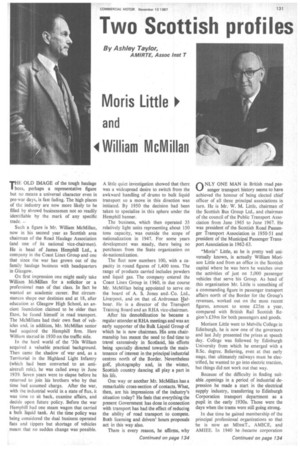Mans Little
Page 133

If you've noticed an error in this article please click here to report it so we can fix it.
and
William McMillan
THE OLD IMAGE of the tough haulage I boss, perhaps a representative figure but no means a universal character even in pre-war days, is fast fading. The high places of the industry are now more likely to be filled by shrewd businessmen not so readily identifiable by the mark of any specific trade. — Such a figure is Mr. William McMillan, now in his second year as Scottish area chairman of the Road Haulage Association (and one of its national vice-chairmen). He is head of James Hemphill Ltd., a company in the Coast Lines Group and one that since the war has grown out of the family haulage business with headquarters in Glasgow.
On first impression one might easily take William McMillan for a solicitor or a professional man of that class. In fact he wanted an academic career. But circumstances shape our destinies and at 18, after education at Glasgow High School, an ancient foundation claimed to be older than Eton, he found himself in road transport. The McMillans had their own fleet of vehicles and, in addition, Mr. McMillan senior had acquired the Hemphill firm. Here William started in 1930 on the traffic side.
In the hard world of the '30s William acquired a valuable practical background. Then came the shadow of war and, as a Territorial in the Highland Light Infantry (which had been converted to an antiaircraft role), he was called away in June 1939. Seven years were to elapse before he returned to join his brothers who by that time had assumed charge. After the war, with the industrial world in a state of flux, it was time to sit back, examine affairs, and decide upon future policy. Before the war Hemphill had one steam wagon that carried a bulk liquid tank. At the time policy was being considered the dual business operated flats and tippers but shortage of vehicles meant that no sudden change was possible. A little quiet investigation showed that there was a widespread desire to switch from the awkward handling of drums to bulk liquid transport so a move in this direction was initiated. By 1950 the decision had been taken to specialize in this sphere under the Hemphill banner.
The business, which then operated 35 relatively light units representing about 150 tons capacity, was outside the scope of nationalization in 1947. For some years development was steady, there being no purchases from the State organization on dc-nationalization.
The fleet now numbers 100, with a capacity in round figures of 1,400 tons. The range of products carried includes powders and liquid gas. The company entered the Coast Lines Group in. 1960, in due course Mr. McMillan being appointed to serve on the board of A. S. Jones and. Co. Ltd., Liverpool, and on that ofArdrossan bour. He is a director of the Transport Training Board and an RHA vice-chairman.
After his demobilization he became a regular attender at RHA meetings and was an early supporter of the Bulk Liquid Group of which he is now chairman. His area chairmanship has meant the need to find time to travel extensively in Scotland, his efforts being specially directed towards the maintenance of interest in the principal industrial centres north of the Border. Nevertheless golf, photography and, in the winter, Scottish country dancing all play a part in his life.
One way or another Mr. McMillan has a remarkable cross-section of contacts. What, then, are his impressions of the industry's situation today? He feels that everything the present Government has done in connection with transport has had the effect of reducing the ability of road transport to compete. Both licensing and drivers' hours proposals act in this way also.
There is every reason, he affirms, why
ONLY ONE MAN in British road passenger transport history seems to have achieved the honour of being elected chief officer of all three principal associations in turn. He is Mr. W. M. Little, chairman of the Scottish Bus Group Ltd., and chairman of the council of the Public Transport Association from June 1965 to June 1967. He was president of the Scottish Road Passenger Transport Association in 1950-51 and president of the Municipal Passenger Transport Association in 1962-63.
"Moris" Little, as he is pretty well universally known, is actually William Morison Little and from an office in the Scottish capital where he was born he watches oVer the activities of just on 5,000 passenger vehicles that serve his Group. As head of this organization Mr. Little is something of a commanding figure in passenger transport affairs north of the Border for the Group's revenues, worked out on the most recent figures, amount to some £25m a year, compared with British Rail Scottish Region's £39m for both passengers and goods.
Morison Little went to Melville College in Edinburgh, he is now one of the governors and last July presented the prizes at speech day. College was followed by Edinburgh University from which he emerged with a B.Sc. degree. Believing, even at that early stage, that ultimately railways must be electrified, he wanted to go into electric traction, but things did not work out that way.
Because of the difficulty in finding suitable .openings in a period of industrial depression he made a start in the electrical supply industry, transferring to Edinburgh Corporation transport department as a pupil in the early 1930s. Those were the days when the trams were still going strong.
In due time he gained membership of the principal professional organizations so that he is now an MInstT., AMICE, and AMIEE. In 1940 he became corporation




































































































































































































































































